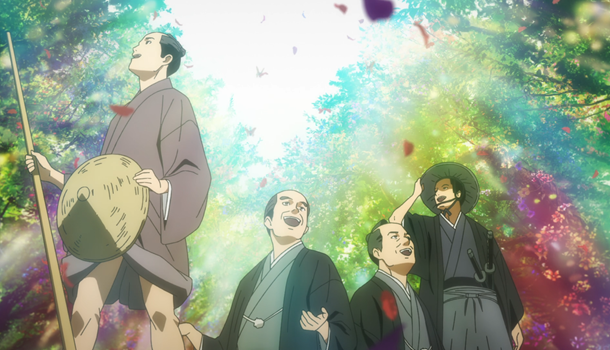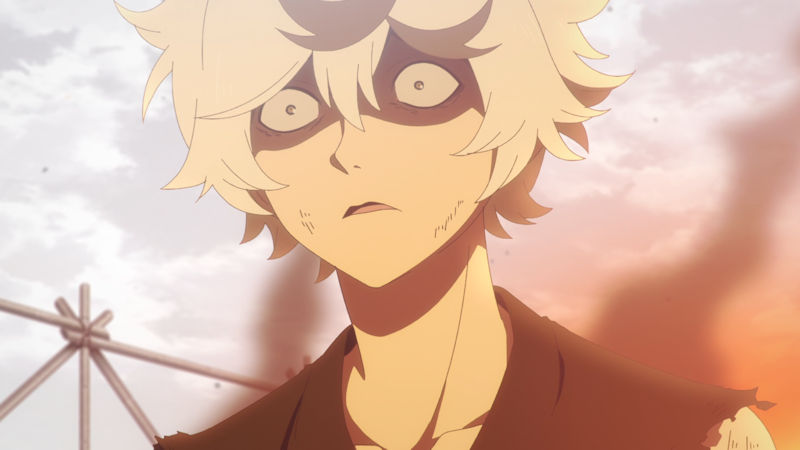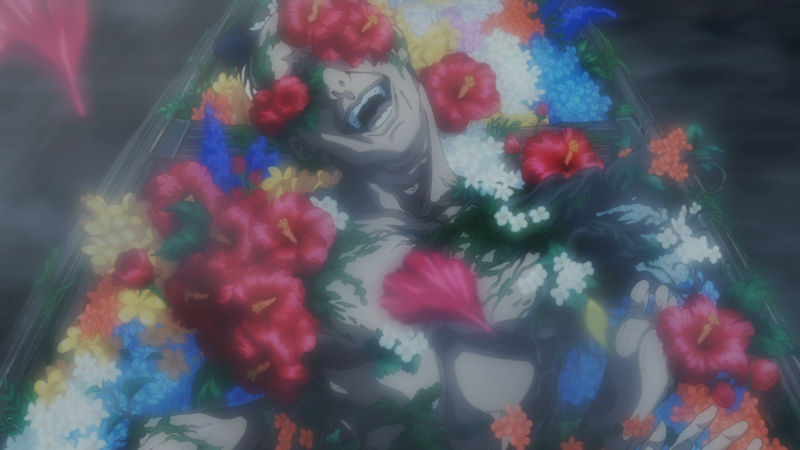
Written by Archie Fenn on 04 Apr 2023
Distributor • Certificate • Price
MAPPA Studios are really swinging for the bleachers this year. Vinland Saga S2 is currently a very strong start to 2023, not to mention the newest segment of the pop culture phenom that is Attack on Titan raking in millions of viewers on Crunchyroll. Their newest release is Hell's Paradise, an adaptation of Yuji Kaku's beloved Shonen manga of the same name. Much like MAPPA's 2023 roster, Hell's Paradise's first episode is also off to a very strong start, expertly establishing the characters, aesthetics, and themes that will be explored in the episodes to come.
Spoilers Ahead for Episode 1!
The opening voiceover wastes no time in setting the tone. By discussing the reality of the executions by beheading, Hell's Paradise immediately informs its audience that the show is going to be a violent, bloody affair. The voiceover also contrasts the reality of the method with how it is shown in media, saying: "Beheading a person with a single blow is next to impossible. In most cases, several blows are required to behead a person." Not only does this perfectly establish the tone, but also uses hyper-violence to show the pacifist ideals that protagonist Gabimaru hopes to achieve to live happily with his wife, similar to Thorfinn's journey in Vinland Saga. The opening scene is also framed similarly to that of Samurai Champloo, paying homage to one of the greats of the Samurai genre.

Rightfully, Gabimaru steals the spotlight of the first episode. The episode offers insight into his harsh background as a Shinobi of Iwagakure village, leading to his apathetic demeanour and initial desire to die. Despite the episode only being 24 minutes long, it offers viewers a lot to unpack regarding Gabimaru's psyche, most notably, the juxtaposition between his expressed wish to die and his subconscious desire for survival. Gabimaru exudes the persona one would expect from a lifelong Shinobi, cold and heartless ("hollow" even) and reveals to Sagiri that it is all he's ever known. He even lies to her, and himself, about his feelings towards his wife because it conflicts with his persona. Gabimaru's psyche and calculated apathy will be fascinating to explore and unpack in further episodes and makes for one of the most thought-provoking character studies in modern Shonen anime.
As well as its introspective, 3-dimensional characters, the episode's visuals are a high point, and will likely remain that way throughout the show. The majority of the episode is shot and lit as drably as you would expect from an episode set almost entirely in a torture chamber. However, this dirty colour palette heavily contrasts the vibrant and serene visuals teased in the opening credits and flashbacks. By juxtaposing the two styles, MAPPA accentuates the deceptive beauty of 'Paradise', whilst cementing the despotic reality of the Edo period, especially in Iwagakure village. The show also utilises traditional Japanese art styles in its flashbacks. The story of 'Paradise', told by Sagiri, is animated to look like Ukiyo-e block prints, while the still images from Gabimaru's flashbacks look like they've been ripped straight out of a Kuniyoshi collection. As well as the juxtaposition between 'Paradise' and Edo-era Japan, the gorgeous visuals will also contrast the Cronenberg-esque body horror the episode teased during one of the flashbacks.
On top of the pre-established themes of nihilism and our survivalist nature as humans, Hell's Paradise could also explore the religious symbolism of Hell/'The Other Side'. While the topic is not overtly mentioned in the first episode, elements of the story and worldbuilding are heavily inspired by religious tales and artefacts, including the concept of Hell, the 'Elixir of Life' (inspired by the Taino Indian legend of the 'Fountain of Youth') and the 'Forbidden Fruit' from Christianity. What would make the exploration of religious symbolism even more interesting in the show, is the fact that Christianity was banned during the Edo period, with anyone publicly practising the religion facing persecution. While this is all speculation for future episodes, the foundations to explore these themes are well established and it would add another layer of depth to an already promising series.

Despite its numerous strong points, the episode suffers from one issue, the speed of Gabimaru's character growth. To many viewers, his quick change from suicidal tendencies to a passion to be free and reunited with his wife felt rushed, and too big a character development for a single episode. However, the show still has a lot of characters to introduce and an exciting, action-packed plot to explore, meaning the decision to contain Gabimaru's development to a single episode is understandable to help the plot move at an entertaining pace.

Archie is a writer, journalist, and critic from South London. He spends most of his free time (and his work hours) watching and writing about cowboys in space and hip-hop samurai. His parents are very proud of him.
Throughout his growing career, Archie has written reviews and feature articles about some of the biggest franchises in entertainment, including Attack on Titan, John Wick, NieR, and many more. He loves writing about how we can learn and grow from the media we consume.
You can learn more at his site theinsightfulnerd.com or his author website archiefenn.com
by Ross Locksley on 08 Feb 2026
by Ross Locksley on 25 Jan 2026
by Ross Locksley on 01 Jan 2026
by Ross Locksley on 21 Dec 2025
by Ross Locksley on 25 Nov 2025
by Ross Locksley on 24 Nov 2025
by Ross Locksley on 11 Nov 2025
by Ross Locksley on 08 Nov 2025